BMP3004: Exploring Factors that Motivate Employees to Work
VerifiedAdded on 2023/06/17
|7
|1953
|428
Report
AI Summary
This report defines motivation and explores the factors that motivate employees to work, including salary, promotion opportunities, and a positive work environment. It discusses positive factors such as friendly coworkers, achievement recognition, and being part of a successful team, as well as negative factors like low wages, poor management, and excessive workloads. Strategies to cope with negative factors include fostering trust and respect, providing opportunities to express opinions, offering rewards, and establishing a clear framework. The report concludes that understanding and addressing these factors is crucial for enhancing employee satisfaction and productivity, contributing to the overall success of the business. Desklib offers similar resources for students.
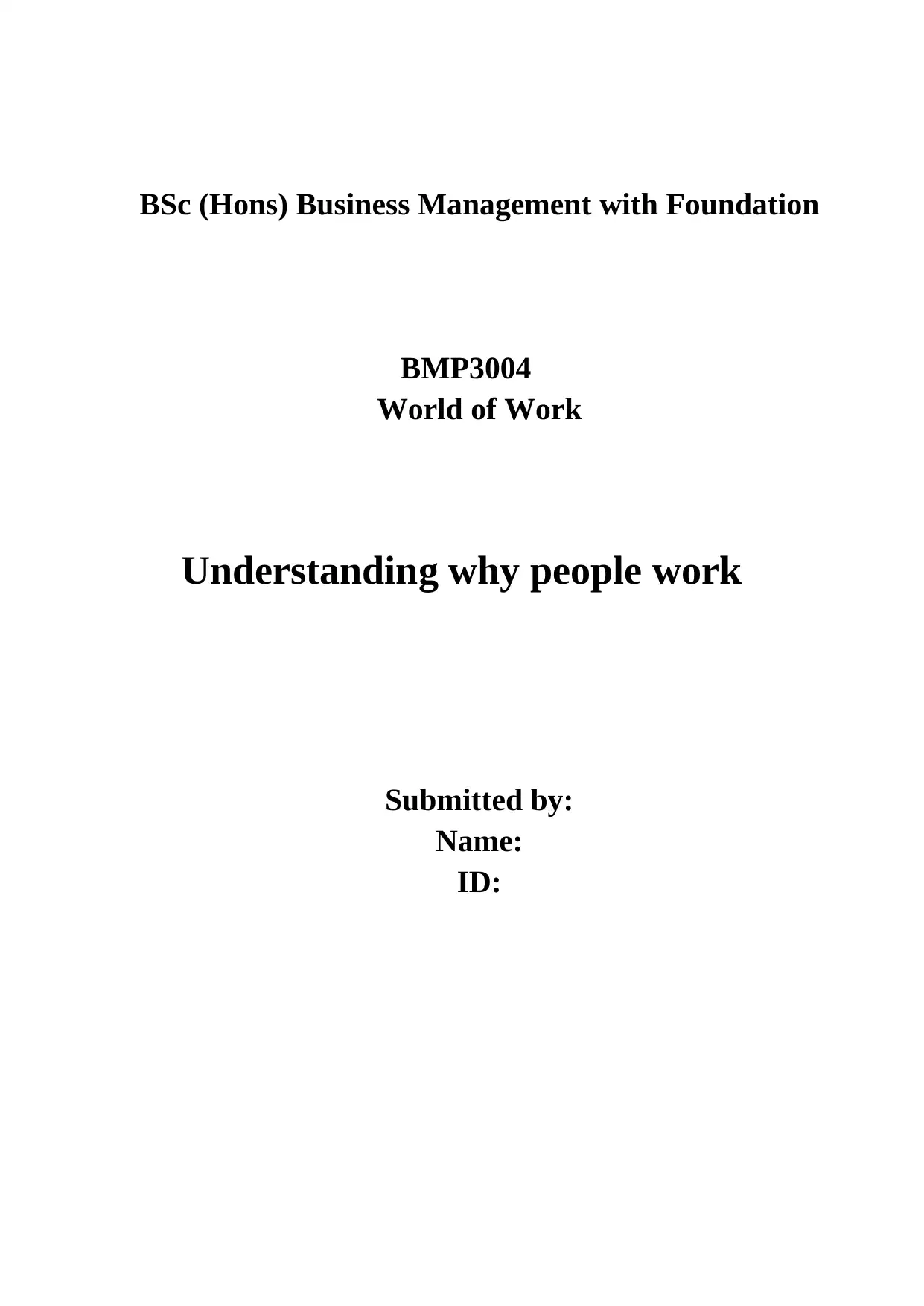
BSc (Hons) Business Management with Foundation
BMP3004
World of Work
Understanding why people work
Submitted by:
Name:
ID:
BMP3004
World of Work
Understanding why people work
Submitted by:
Name:
ID:
Paraphrase This Document
Need a fresh take? Get an instant paraphrase of this document with our AI Paraphraser
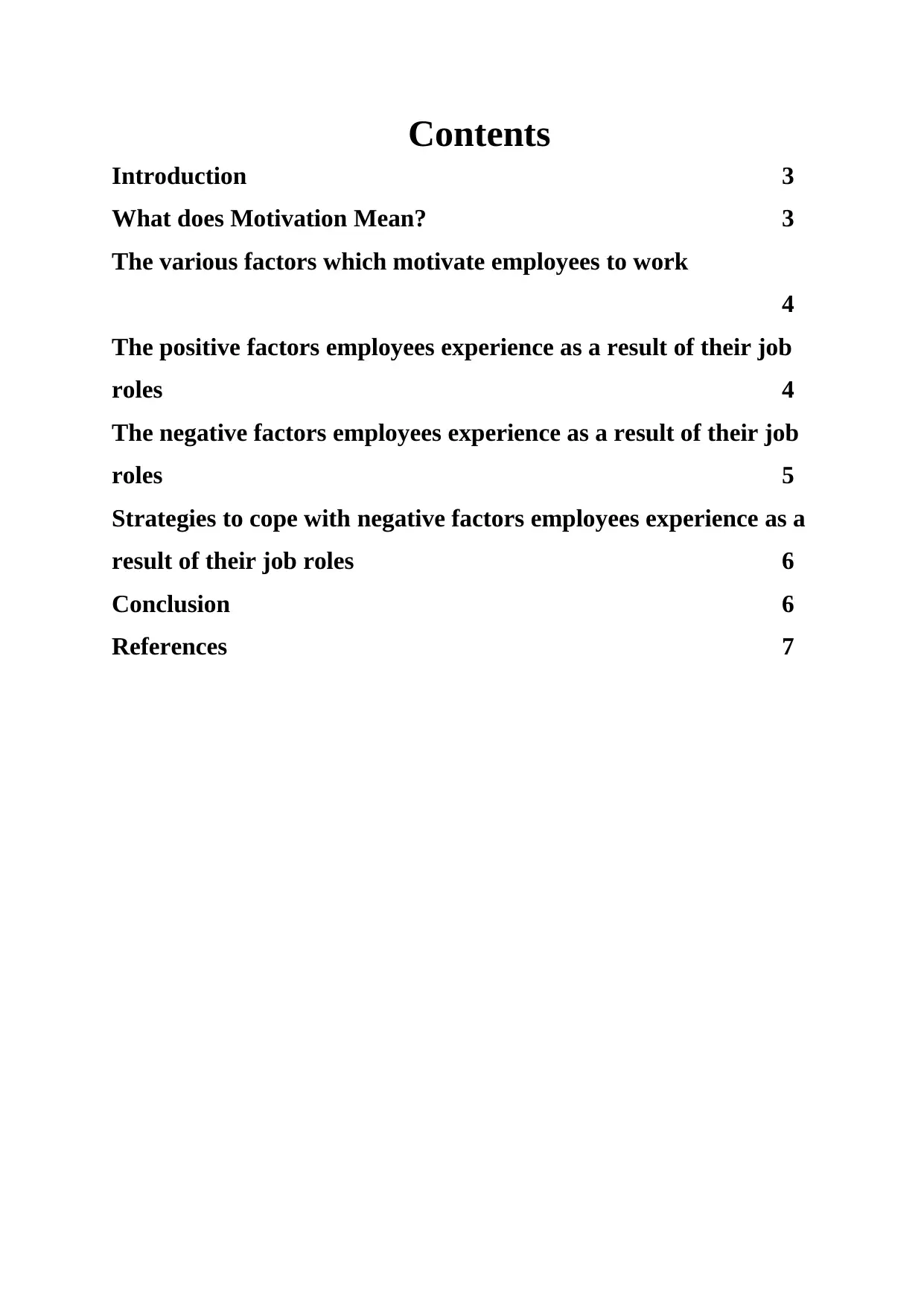
Contents
Introduction 3
What does Motivation Mean? 3
The various factors which motivate employees to work
4
The positive factors employees experience as a result of their job
roles 4
The negative factors employees experience as a result of their job
roles 5
Strategies to cope with negative factors employees experience as a
result of their job roles 6
Conclusion 6
References 7
Introduction 3
What does Motivation Mean? 3
The various factors which motivate employees to work
4
The positive factors employees experience as a result of their job
roles 4
The negative factors employees experience as a result of their job
roles 5
Strategies to cope with negative factors employees experience as a
result of their job roles 6
Conclusion 6
References 7
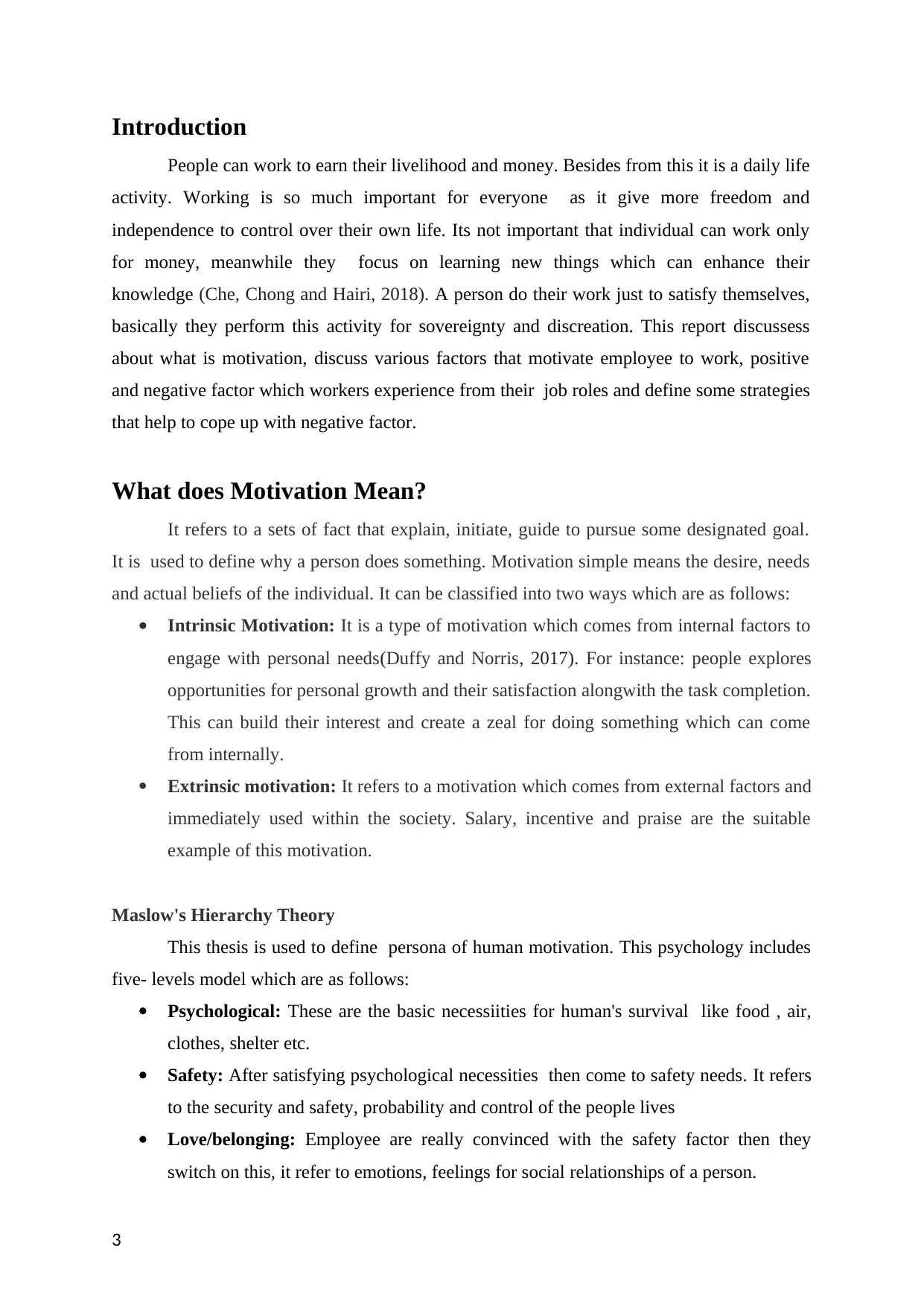
Introduction
People can work to earn their livelihood and money. Besides from this it is a daily life
activity. Working is so much important for everyone as it give more freedom and
independence to control over their own life. Its not important that individual can work only
for money, meanwhile they focus on learning new things which can enhance their
knowledge (Che, Chong and Hairi, 2018). A person do their work just to satisfy themselves,
basically they perform this activity for sovereignty and discreation. This report discussess
about what is motivation, discuss various factors that motivate employee to work, positive
and negative factor which workers experience from their job roles and define some strategies
that help to cope up with negative factor.
What does Motivation Mean?
It refers to a sets of fact that explain, initiate, guide to pursue some designated goal.
It is used to define why a person does something. Motivation simple means the desire, needs
and actual beliefs of the individual. It can be classified into two ways which are as follows:
Intrinsic Motivation: It is a type of motivation which comes from internal factors to
engage with personal needs(Duffy and Norris, 2017). For instance: people explores
opportunities for personal growth and their satisfaction alongwith the task completion.
This can build their interest and create a zeal for doing something which can come
from internally.
Extrinsic motivation: It refers to a motivation which comes from external factors and
immediately used within the society. Salary, incentive and praise are the suitable
example of this motivation.
Maslow's Hierarchy Theory
This thesis is used to define persona of human motivation. This psychology includes
five- levels model which are as follows:
Psychological: These are the basic necessiities for human's survival like food , air,
clothes, shelter etc.
Safety: After satisfying psychological necessities then come to safety needs. It refers
to the security and safety, probability and control of the people lives
Love/belonging: Employee are really convinced with the safety factor then they
switch on this, it refer to emotions, feelings for social relationships of a person.
3
People can work to earn their livelihood and money. Besides from this it is a daily life
activity. Working is so much important for everyone as it give more freedom and
independence to control over their own life. Its not important that individual can work only
for money, meanwhile they focus on learning new things which can enhance their
knowledge (Che, Chong and Hairi, 2018). A person do their work just to satisfy themselves,
basically they perform this activity for sovereignty and discreation. This report discussess
about what is motivation, discuss various factors that motivate employee to work, positive
and negative factor which workers experience from their job roles and define some strategies
that help to cope up with negative factor.
What does Motivation Mean?
It refers to a sets of fact that explain, initiate, guide to pursue some designated goal.
It is used to define why a person does something. Motivation simple means the desire, needs
and actual beliefs of the individual. It can be classified into two ways which are as follows:
Intrinsic Motivation: It is a type of motivation which comes from internal factors to
engage with personal needs(Duffy and Norris, 2017). For instance: people explores
opportunities for personal growth and their satisfaction alongwith the task completion.
This can build their interest and create a zeal for doing something which can come
from internally.
Extrinsic motivation: It refers to a motivation which comes from external factors and
immediately used within the society. Salary, incentive and praise are the suitable
example of this motivation.
Maslow's Hierarchy Theory
This thesis is used to define persona of human motivation. This psychology includes
five- levels model which are as follows:
Psychological: These are the basic necessiities for human's survival like food , air,
clothes, shelter etc.
Safety: After satisfying psychological necessities then come to safety needs. It refers
to the security and safety, probability and control of the people lives
Love/belonging: Employee are really convinced with the safety factor then they
switch on this, it refer to emotions, feelings for social relationships of a person.
3
⊘ This is a preview!⊘
Do you want full access?
Subscribe today to unlock all pages.

Trusted by 1+ million students worldwide
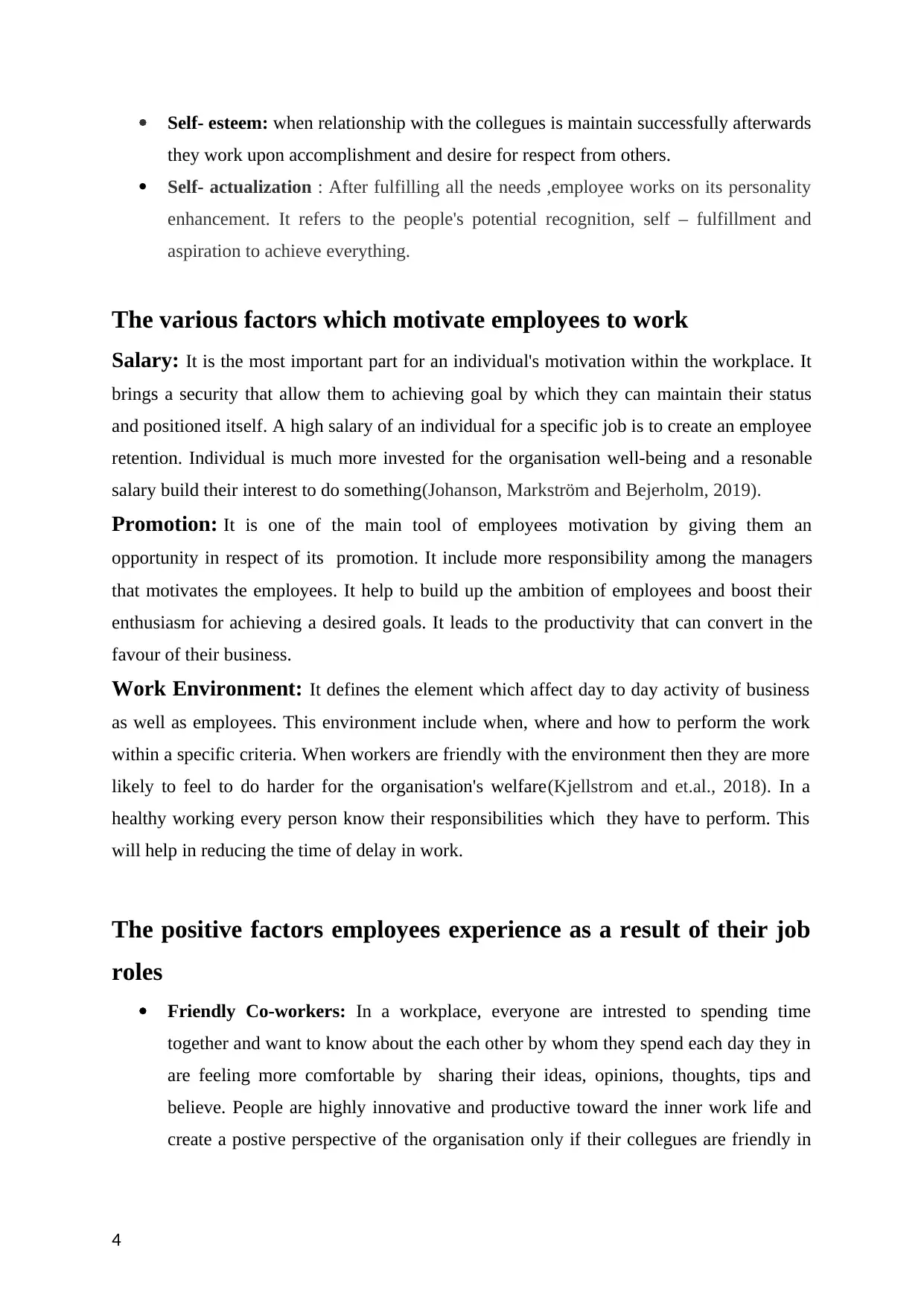
Self- esteem: when relationship with the collegues is maintain successfully afterwards
they work upon accomplishment and desire for respect from others.
Self- actualization : After fulfilling all the needs ,employee works on its personality
enhancement. It refers to the people's potential recognition, self – fulfillment and
aspiration to achieve everything.
The various factors which motivate employees to work
Salary: It is the most important part for an individual's motivation within the workplace. It
brings a security that allow them to achieving goal by which they can maintain their status
and positioned itself. A high salary of an individual for a specific job is to create an employee
retention. Individual is much more invested for the organisation well-being and a resonable
salary build their interest to do something(Johanson, Markström and Bejerholm, 2019).
Promotion: It is one of the main tool of employees motivation by giving them an
opportunity in respect of its promotion. It include more responsibility among the managers
that motivates the employees. It help to build up the ambition of employees and boost their
enthusiasm for achieving a desired goals. It leads to the productivity that can convert in the
favour of their business.
Work Environment: It defines the element which affect day to day activity of business
as well as employees. This environment include when, where and how to perform the work
within a specific criteria. When workers are friendly with the environment then they are more
likely to feel to do harder for the organisation's welfare(Kjellstrom and et.al., 2018). In a
healthy working every person know their responsibilities which they have to perform. This
will help in reducing the time of delay in work.
The positive factors employees experience as a result of their job
roles
Friendly Co-workers: In a workplace, everyone are intrested to spending time
together and want to know about the each other by whom they spend each day they in
are feeling more comfortable by sharing their ideas, opinions, thoughts, tips and
believe. People are highly innovative and productive toward the inner work life and
create a postive perspective of the organisation only if their collegues are friendly in
4
they work upon accomplishment and desire for respect from others.
Self- actualization : After fulfilling all the needs ,employee works on its personality
enhancement. It refers to the people's potential recognition, self – fulfillment and
aspiration to achieve everything.
The various factors which motivate employees to work
Salary: It is the most important part for an individual's motivation within the workplace. It
brings a security that allow them to achieving goal by which they can maintain their status
and positioned itself. A high salary of an individual for a specific job is to create an employee
retention. Individual is much more invested for the organisation well-being and a resonable
salary build their interest to do something(Johanson, Markström and Bejerholm, 2019).
Promotion: It is one of the main tool of employees motivation by giving them an
opportunity in respect of its promotion. It include more responsibility among the managers
that motivates the employees. It help to build up the ambition of employees and boost their
enthusiasm for achieving a desired goals. It leads to the productivity that can convert in the
favour of their business.
Work Environment: It defines the element which affect day to day activity of business
as well as employees. This environment include when, where and how to perform the work
within a specific criteria. When workers are friendly with the environment then they are more
likely to feel to do harder for the organisation's welfare(Kjellstrom and et.al., 2018). In a
healthy working every person know their responsibilities which they have to perform. This
will help in reducing the time of delay in work.
The positive factors employees experience as a result of their job
roles
Friendly Co-workers: In a workplace, everyone are intrested to spending time
together and want to know about the each other by whom they spend each day they in
are feeling more comfortable by sharing their ideas, opinions, thoughts, tips and
believe. People are highly innovative and productive toward the inner work life and
create a postive perspective of the organisation only if their collegues are friendly in
4
Paraphrase This Document
Need a fresh take? Get an instant paraphrase of this document with our AI Paraphraser
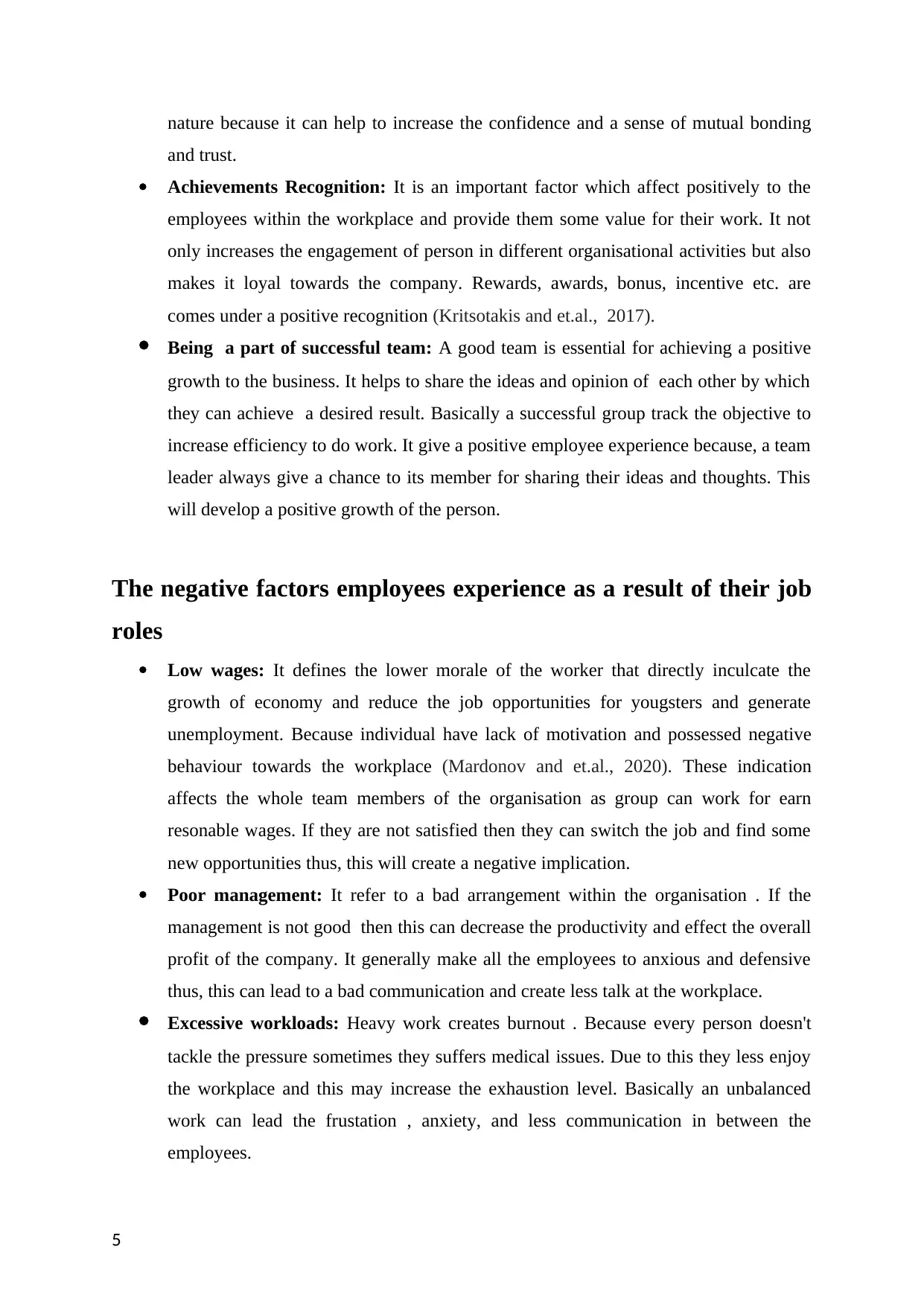
nature because it can help to increase the confidence and a sense of mutual bonding
and trust.
Achievements Recognition: It is an important factor which affect positively to the
employees within the workplace and provide them some value for their work. It not
only increases the engagement of person in different organisational activities but also
makes it loyal towards the company. Rewards, awards, bonus, incentive etc. are
comes under a positive recognition (Kritsotakis and et.al., 2017).
Being a part of successful team: A good team is essential for achieving a positive
growth to the business. It helps to share the ideas and opinion of each other by which
they can achieve a desired result. Basically a successful group track the objective to
increase efficiency to do work. It give a positive employee experience because, a team
leader always give a chance to its member for sharing their ideas and thoughts. This
will develop a positive growth of the person.
The negative factors employees experience as a result of their job
roles
Low wages: It defines the lower morale of the worker that directly inculcate the
growth of economy and reduce the job opportunities for yougsters and generate
unemployment. Because individual have lack of motivation and possessed negative
behaviour towards the workplace (Mardonov and et.al., 2020). These indication
affects the whole team members of the organisation as group can work for earn
resonable wages. If they are not satisfied then they can switch the job and find some
new opportunities thus, this will create a negative implication.
Poor management: It refer to a bad arrangement within the organisation . If the
management is not good then this can decrease the productivity and effect the overall
profit of the company. It generally make all the employees to anxious and defensive
thus, this can lead to a bad communication and create less talk at the workplace.
Excessive workloads: Heavy work creates burnout . Because every person doesn't
tackle the pressure sometimes they suffers medical issues. Due to this they less enjoy
the workplace and this may increase the exhaustion level. Basically an unbalanced
work can lead the frustation , anxiety, and less communication in between the
employees.
5
and trust.
Achievements Recognition: It is an important factor which affect positively to the
employees within the workplace and provide them some value for their work. It not
only increases the engagement of person in different organisational activities but also
makes it loyal towards the company. Rewards, awards, bonus, incentive etc. are
comes under a positive recognition (Kritsotakis and et.al., 2017).
Being a part of successful team: A good team is essential for achieving a positive
growth to the business. It helps to share the ideas and opinion of each other by which
they can achieve a desired result. Basically a successful group track the objective to
increase efficiency to do work. It give a positive employee experience because, a team
leader always give a chance to its member for sharing their ideas and thoughts. This
will develop a positive growth of the person.
The negative factors employees experience as a result of their job
roles
Low wages: It defines the lower morale of the worker that directly inculcate the
growth of economy and reduce the job opportunities for yougsters and generate
unemployment. Because individual have lack of motivation and possessed negative
behaviour towards the workplace (Mardonov and et.al., 2020). These indication
affects the whole team members of the organisation as group can work for earn
resonable wages. If they are not satisfied then they can switch the job and find some
new opportunities thus, this will create a negative implication.
Poor management: It refer to a bad arrangement within the organisation . If the
management is not good then this can decrease the productivity and effect the overall
profit of the company. It generally make all the employees to anxious and defensive
thus, this can lead to a bad communication and create less talk at the workplace.
Excessive workloads: Heavy work creates burnout . Because every person doesn't
tackle the pressure sometimes they suffers medical issues. Due to this they less enjoy
the workplace and this may increase the exhaustion level. Basically an unbalanced
work can lead the frustation , anxiety, and less communication in between the
employees.
5
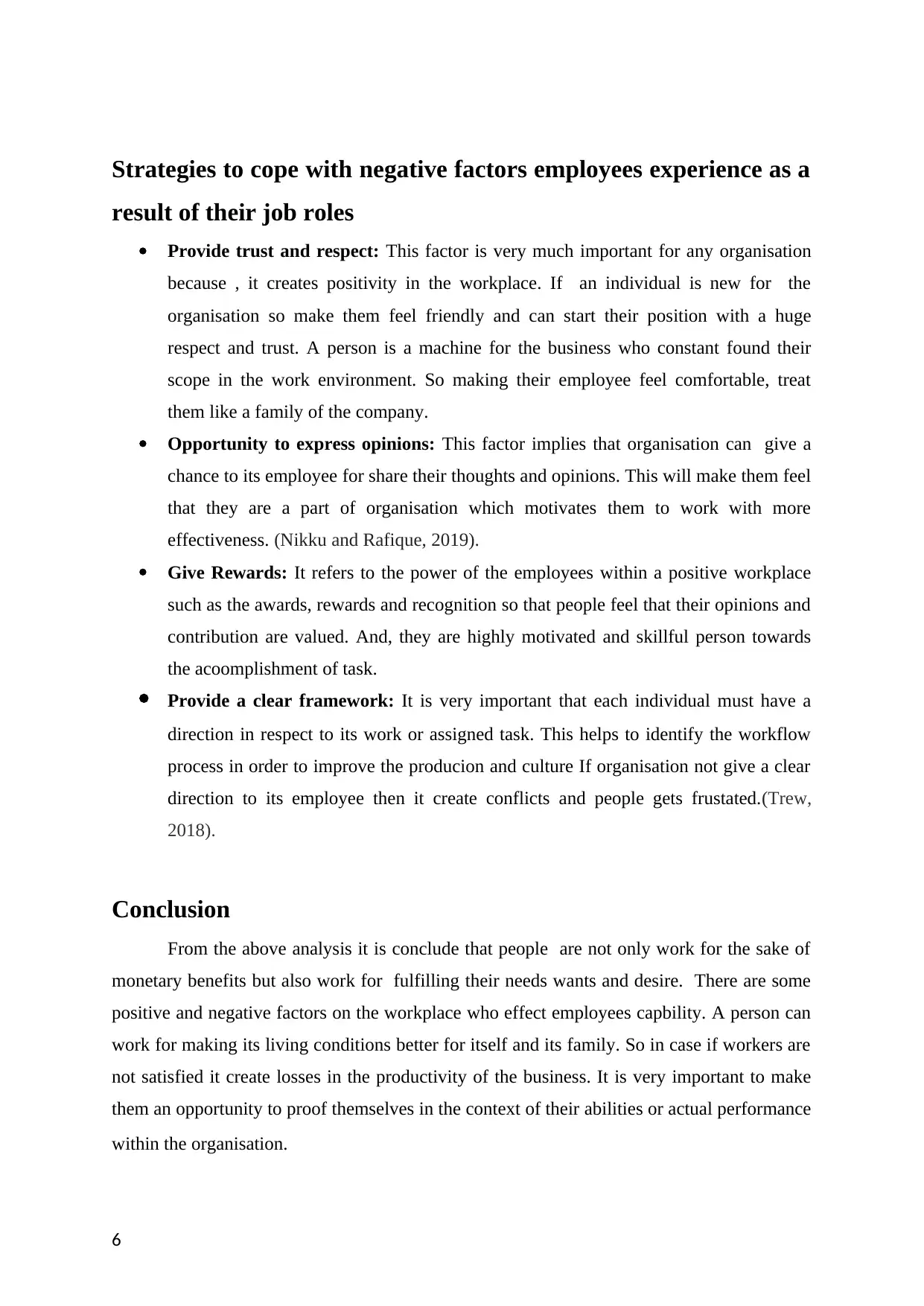
Strategies to cope with negative factors employees experience as a
result of their job roles
Provide trust and respect: This factor is very much important for any organisation
because , it creates positivity in the workplace. If an individual is new for the
organisation so make them feel friendly and can start their position with a huge
respect and trust. A person is a machine for the business who constant found their
scope in the work environment. So making their employee feel comfortable, treat
them like a family of the company.
Opportunity to express opinions: This factor implies that organisation can give a
chance to its employee for share their thoughts and opinions. This will make them feel
that they are a part of organisation which motivates them to work with more
effectiveness. (Nikku and Rafique, 2019).
Give Rewards: It refers to the power of the employees within a positive workplace
such as the awards, rewards and recognition so that people feel that their opinions and
contribution are valued. And, they are highly motivated and skillful person towards
the acoomplishment of task.
Provide a clear framework: It is very important that each individual must have a
direction in respect to its work or assigned task. This helps to identify the workflow
process in order to improve the producion and culture If organisation not give a clear
direction to its employee then it create conflicts and people gets frustated.(Trew,
2018).
Conclusion
From the above analysis it is conclude that people are not only work for the sake of
monetary benefits but also work for fulfilling their needs wants and desire. There are some
positive and negative factors on the workplace who effect employees capbility. A person can
work for making its living conditions better for itself and its family. So in case if workers are
not satisfied it create losses in the productivity of the business. It is very important to make
them an opportunity to proof themselves in the context of their abilities or actual performance
within the organisation.
6
result of their job roles
Provide trust and respect: This factor is very much important for any organisation
because , it creates positivity in the workplace. If an individual is new for the
organisation so make them feel friendly and can start their position with a huge
respect and trust. A person is a machine for the business who constant found their
scope in the work environment. So making their employee feel comfortable, treat
them like a family of the company.
Opportunity to express opinions: This factor implies that organisation can give a
chance to its employee for share their thoughts and opinions. This will make them feel
that they are a part of organisation which motivates them to work with more
effectiveness. (Nikku and Rafique, 2019).
Give Rewards: It refers to the power of the employees within a positive workplace
such as the awards, rewards and recognition so that people feel that their opinions and
contribution are valued. And, they are highly motivated and skillful person towards
the acoomplishment of task.
Provide a clear framework: It is very important that each individual must have a
direction in respect to its work or assigned task. This helps to identify the workflow
process in order to improve the producion and culture If organisation not give a clear
direction to its employee then it create conflicts and people gets frustated.(Trew,
2018).
Conclusion
From the above analysis it is conclude that people are not only work for the sake of
monetary benefits but also work for fulfilling their needs wants and desire. There are some
positive and negative factors on the workplace who effect employees capbility. A person can
work for making its living conditions better for itself and its family. So in case if workers are
not satisfied it create losses in the productivity of the business. It is very important to make
them an opportunity to proof themselves in the context of their abilities or actual performance
within the organisation.
6
⊘ This is a preview!⊘
Do you want full access?
Subscribe today to unlock all pages.

Trusted by 1+ million students worldwide
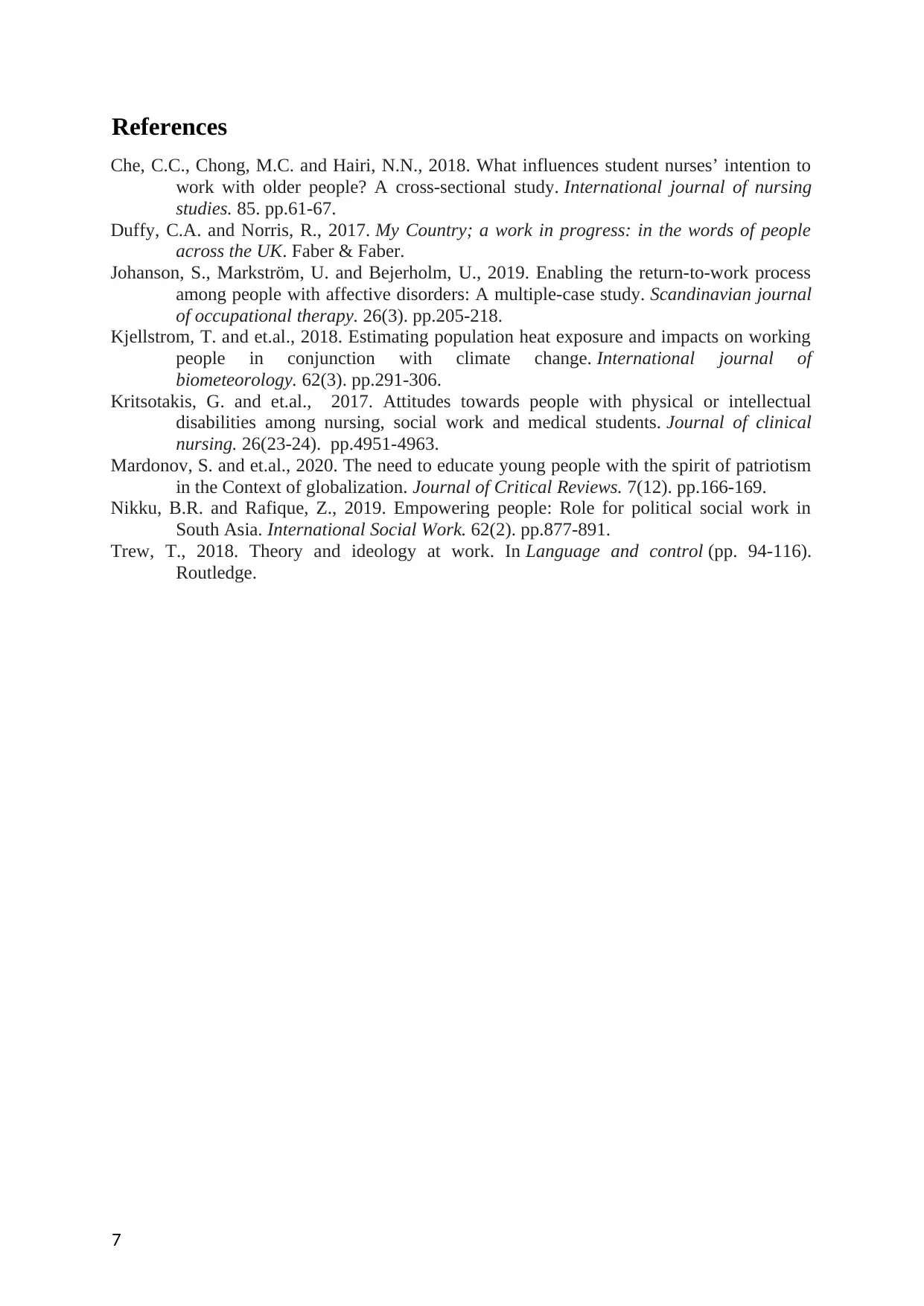
References
Che, C.C., Chong, M.C. and Hairi, N.N., 2018. What influences student nurses’ intention to
work with older people? A cross-sectional study. International journal of nursing
studies. 85. pp.61-67.
Duffy, C.A. and Norris, R., 2017. My Country; a work in progress: in the words of people
across the UK. Faber & Faber.
Johanson, S., Markström, U. and Bejerholm, U., 2019. Enabling the return-to-work process
among people with affective disorders: A multiple-case study. Scandinavian journal
of occupational therapy. 26(3). pp.205-218.
Kjellstrom, T. and et.al., 2018. Estimating population heat exposure and impacts on working
people in conjunction with climate change. International journal of
biometeorology. 62(3). pp.291-306.
Kritsotakis, G. and et.al., 2017. Attitudes towards people with physical or intellectual
disabilities among nursing, social work and medical students. Journal of clinical
nursing. 26(23-24). pp.4951-4963.
Mardonov, S. and et.al., 2020. The need to educate young people with the spirit of patriotism
in the Context of globalization. Journal of Critical Reviews. 7(12). pp.166-169.
Nikku, B.R. and Rafique, Z., 2019. Empowering people: Role for political social work in
South Asia. International Social Work. 62(2). pp.877-891.
Trew, T., 2018. Theory and ideology at work. In Language and control (pp. 94-116).
Routledge.
7
Che, C.C., Chong, M.C. and Hairi, N.N., 2018. What influences student nurses’ intention to
work with older people? A cross-sectional study. International journal of nursing
studies. 85. pp.61-67.
Duffy, C.A. and Norris, R., 2017. My Country; a work in progress: in the words of people
across the UK. Faber & Faber.
Johanson, S., Markström, U. and Bejerholm, U., 2019. Enabling the return-to-work process
among people with affective disorders: A multiple-case study. Scandinavian journal
of occupational therapy. 26(3). pp.205-218.
Kjellstrom, T. and et.al., 2018. Estimating population heat exposure and impacts on working
people in conjunction with climate change. International journal of
biometeorology. 62(3). pp.291-306.
Kritsotakis, G. and et.al., 2017. Attitudes towards people with physical or intellectual
disabilities among nursing, social work and medical students. Journal of clinical
nursing. 26(23-24). pp.4951-4963.
Mardonov, S. and et.al., 2020. The need to educate young people with the spirit of patriotism
in the Context of globalization. Journal of Critical Reviews. 7(12). pp.166-169.
Nikku, B.R. and Rafique, Z., 2019. Empowering people: Role for political social work in
South Asia. International Social Work. 62(2). pp.877-891.
Trew, T., 2018. Theory and ideology at work. In Language and control (pp. 94-116).
Routledge.
7
1 out of 7
Related Documents
Your All-in-One AI-Powered Toolkit for Academic Success.
+13062052269
info@desklib.com
Available 24*7 on WhatsApp / Email
![[object Object]](/_next/static/media/star-bottom.7253800d.svg)
Unlock your academic potential
Copyright © 2020–2025 A2Z Services. All Rights Reserved. Developed and managed by ZUCOL.

